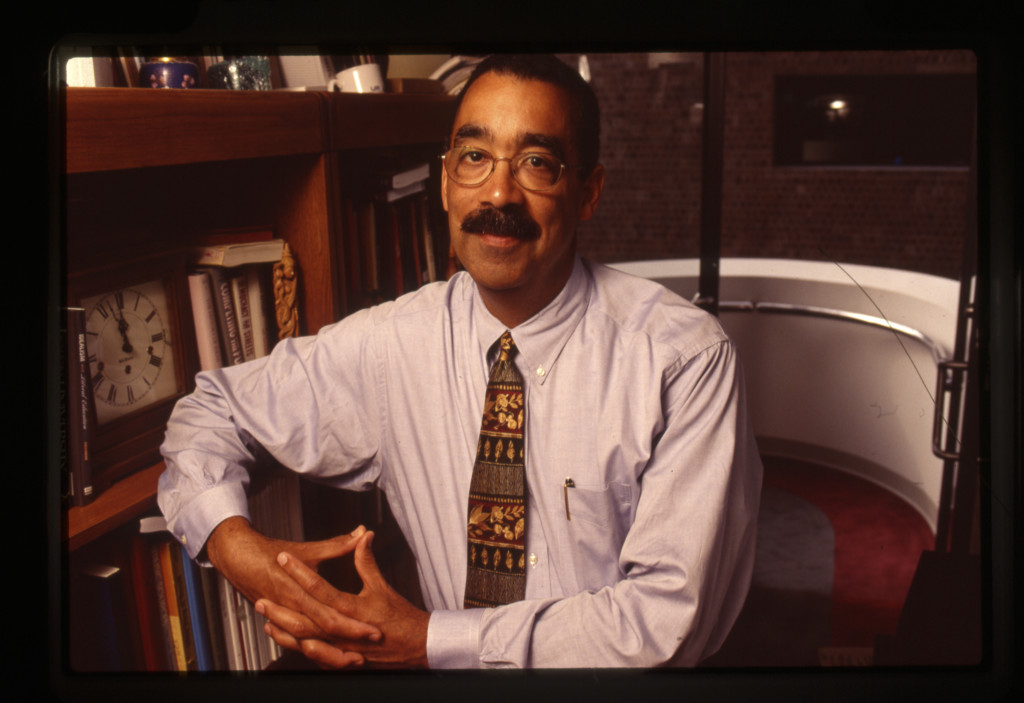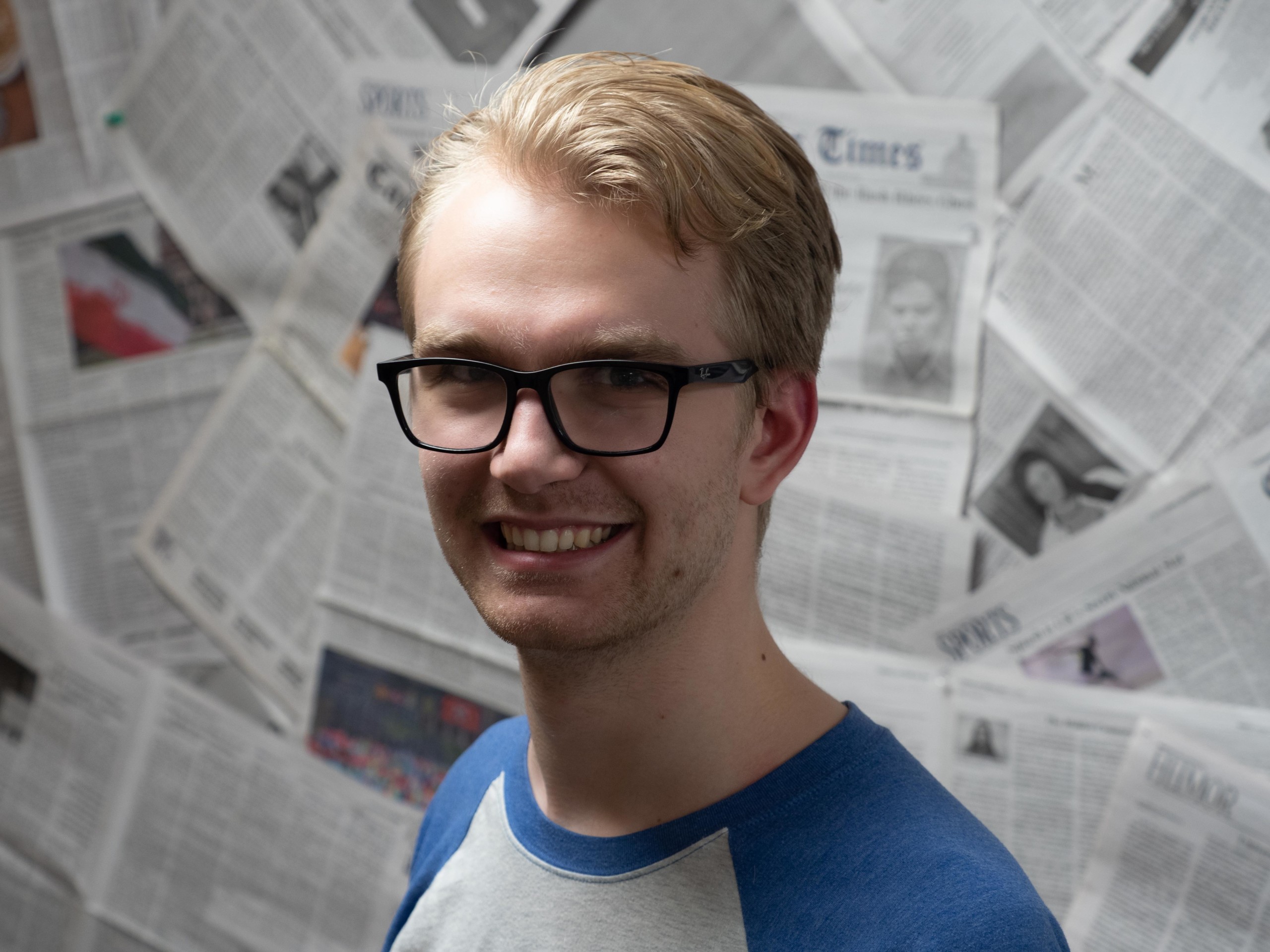After Ph.D. student Jason Buitrago was diagnosed with stage three cancer in 2014, one of his first visitors at the Wilmot Cancer Center was Paul J. Burgett.
“He walked into that infusion center with the most amazing vibrancy during a very scary time in my life and brought a huge smile to my face,” said Buitrago, now the director of academic operations at the Simon School.
Burgett, who died on Aug. 22, his 72nd birthday, had been involved with UR as a student, dean, professor, and vice president for 54 years. By the time of his death, he had become one of the most respected and beloved members of the University community.
When Paul Burgett first entered the Eastman School of Music, he assumed Eastman would be a stepping stone on the road to glory as a violinist of national or greater renown.
In his half-century UR career that followed, he would later tell the story in his frequently performed “The Fiery Furnace” speech.
In a 2013 performance of the speech to Eastman first-years, Burgett described arriving on campus, when the upperclassmen had not yet arrived, and going to the practice rooms. He would play showy pieces with the door cracked open so that everyone could hear.
Then the upperclassmen arrived.
“I pull that practice room door shut, push that handle down, […] put a piece of paper over the window, and a bag over my head so nobody can see who’s making all that noise.”
“I huddled in the Student Living Center, […] waiting for the second letter from the admissions office, the one in the thin envelope, the one telling me that a terrible mistake had been made, that the Paul Burgett they really intended to admit could play the violin […] and asking if I might leave under the cover of darkness to spare us all the embarrassment.”
Burgett went on to get his B.A., M.A., and Ph.D. at Eastman, where he became dean of students in 1981, after working for five years as an assistant music professor at Nazareth College. In 1988, he moved to River Campus, becoming vice president and dean of students, still teaching courses in music. In 2001, his title became vice president, general secretary, and senior advisor to the president under Thomas Jackson (and later Joel Seligman).
Paul Burgett’s public speaking skills were renowned, particularly when it came to “The Fiery Furnace,” which included a recurring message: “Passion and ability drive ambition.”
But Burgett’s public speaking at UR is a story that begins before his professional involvement. In one of his earliest speeches in the aftermath of Martin Luther King Jr’s assassination in 1968, Burgett, a senior at Eastman and the president of its Students’ Association, spoke in Kilbourn Hall. He stressed the importance of nonviolence and love, drawing parallels between Dr. King and Jesus Christ.
“As there were those who picked up the word of that man long ago and preached it through the ages down to a man named Martin Luther King, so must we now, all of us, everyone here, pick up the word from this fallen angel and carry it within us.”
Burgett ended his speech by leading the audience in “We Shall Overcome.”
But, for many, Burgett truly shone in his one-on-one interactions, as a friend and listener.
“He made it personal,” said Dr. Jessica Guzmán-Rea, the director of the Paul J. Burgett Intercultural Center, which was named after him in 2014. “He knew your name. He knew stuff about you.”
“And it wasn’t fake,” she added.
“When he engaged with you, you felt as though he was directly speaking to you, and it was engaging with you, and there was no one else in the room,” Buitrago agreed. “No one else in the world, quite frankly.”
Matthew Burns, the current dean of students, also praised Burgett’s “unique capacity to make you feel listened to and important no matter where you were from.”
“You knew he was listening to you,” Melissa Mead, the University archivist, said.
Mead worked frequently with Burgett, who had a penchant for University history.
“He was here for 54 years and he wanted to know about the other 110.”
As a graduate student, Burgett was frustrated by the absolute lack of courses involving “black American music from a black perspective,” according to a profile in the magazine, About… Time. In the same profile, Burgett said, “Here I was a doctoral student and I wasn’t sure — now this was back in 1972–73 — I wasn’t sure whether Charlie Parker played alto sax or what!”
This drove Burgett to study extensively, leading to his Ph.D. dissertation: “Aesthetics of the Music of Black Americans: A Critical Analysis of the Writing of Selected Black Scholars with implications for Black Music Studies and for Music Education.”
The topic of his dissertation carried over into his work as an educator. Burgett, like many members of the UR administration, taught classes. While many took his classes History of Jazz and The Music of Black Americans, hundreds also took his course Musical Adventures: A Hip Trip.
The course taught students about a wide variety of music and musical opportunities at UR. It also contained both a performance component and an innovative portion where students had to invent their own instruments to improvise with in trios.
“In our culture, people tend to be only passive listeners,” Burgett said in a 1997 UR press release. “We need to push through this tendency and create critical listeners.”
In its first year, the course attracted a hundred students. It continued into the early 2000’s.
Both Buitrago and Burns commented that they were saddened for first-years who would be arriving at UR without being able to meet or hear Paul Burgett.
“It is a little heartbreaking […] that those first year students that have just started with us, a week ago […] will never have experienced Paul Burgett in person,” Buitrago said. “I feel like this is the start of a new generation for these folks who don’t know Paul Burgett. And we’re kind of like the last of the other generation that knew Paul Burgett.”
At one point in his “Fiery Furnace” speech, Burgett asks the audience, “If not you, who?”
Burns, on what he would tell Burgett now, reflected, “Thank you. Job well done. We’ll take it from here. That’s who. We will. That’s who. Your question’s been answered.”
Correction (9/5/18): An earlier version of this article incorrectly stated Jason Buitrago was a masters student when he was visited by Burgett. Buitrago was completing his Ph.D. upon diagnosis and Burgett’s visit.



